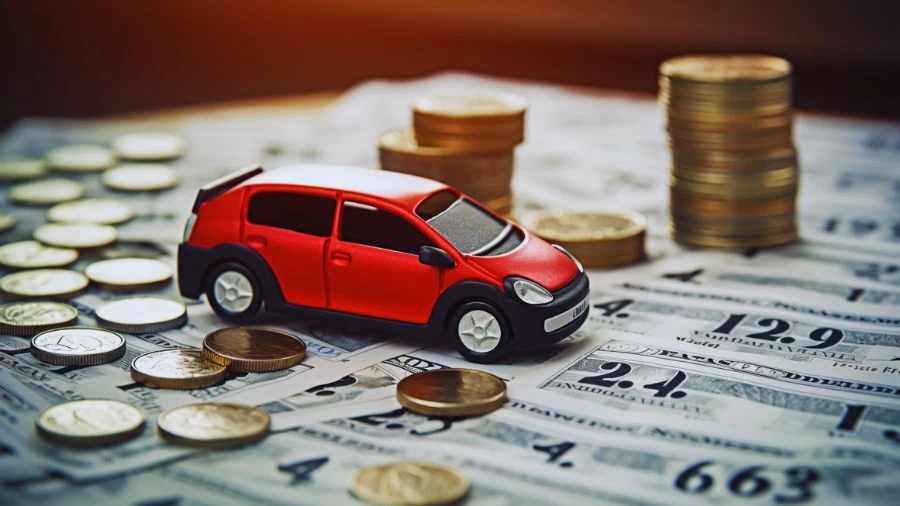
Average Interest Rate for Car Loan, How Do Car Loans Work?
In the third quarter of 2023, the average auto loan interest rates were 7.03% for new cars and 11.35% for used cars, these rates vary based on factors such as income, credit history, and credit score.
Published Aug 05, 2023 | Updated Dec 20, 2023 | 📖 9 min read
On This Page
Average Interest Rate for Car Loan
According to Experian's quarterly Automotive Finance Market report, the average auto loan interest rates in the third quarter of 2023 were 7.03% for new cars and 11.35% for used cars. These rates can vary based on factors such as income, credit history, and credit score. A higher credit score generally results in a lower interest rate, as lenders use it to assess the borrower's likelihood of repaying the loan.
These rates are categorized based on credit scores, allowing prospective borrowers to understand how their creditworthiness can influence the cost of financing a car. Below is a table summarizing the average annual percentage rates (APRs) for car loans according to credit scores:
|
Credit Score Range |
Average APR, New Car |
Average APR, Used Car |
|
Superprime: 781-850 |
5.61% |
7.43% |
|
Prime: 661-780 |
6.88% |
9.33% |
|
Nonprime: 601-660 |
9.29% |
13.53% |
|
Subprime: 501-600 |
11.86% |
18.39% |
|
Deep Subprime: 300-500 |
14.17% |
21.18% |
What Does an Auto Loan Refer to?
An auto loan is a specialized type of installment loan designed for purchasing a vehicle or refinancing an existing auto loan, with the vehicle serving as collateral. It enables individuals to afford cars by spreading the cost over monthly payments, including the principal and accrued interest.
Available from various financial institutions, auto loans play a crucial role in facilitating vehicle ownership, allowing borrowers to gain ownership upon full repayment. It's essential to carefully choose the loan term and monthly payment to manage costs effectively.
How Do Car Loans Work?
Car loans operate through a multi-step process, beginning with the borrower applying for a loan and the lender assessing creditworthiness. The lender determines the loan amount, interest rate, and term based on this evaluation. A down payment may be required, and once approved, the loan is disbursed to the seller.
Loan Application and Approval
- The process starts with the borrower applying for a car loan through various sources like banks, credit unions, online lenders, or dealerships. The lender evaluates creditworthiness by reviewing credit history, score, income, and employment history.
Loan Amount and Interest Rate
- Based on the evaluation, the lender decides the loan amount covering the car's cost, taxes, fees, etc. An interest rate is set, reflecting the cost of borrowing. A higher credit score often leads to a lower interest rate, while a lower score can result in a higher rate.
Loan Term
- The borrower and the lender agree on a loan term, determining the duration of repayment. Common terms range from 36 to 72 months. The loan term, along with the interest rate, influences monthly payments and the total cost of the loan.
Down Payment
- Many car loans require a down payment, an upfront payment towards the car's purchase price. A larger down payment reduces the borrowed amount and can lead to more favorable loan terms. Down payment requirements vary, typically ranging from 10% to 20%.
Loan Disbursement
- Once approved, the lender disburses the loan amount to the seller or dealership. For private sellers, the lender may provide funds directly to the borrower.
Monthly Payments
- Borrowers start making monthly payments covering both principal and interest. The interest portion is higher initially and gradually decreases as the principal is paid down.
Ownership and Collateral
- While making payments, the lender has a lien on the vehicle, technically owning it until the loan is fully repaid. If payments are not made as agreed, the lender can repossess the car as collateral.
Paying Off the Loan
- Payments over time reduce the loan balance. Once the entire loan amount is paid, the lender releases the lien, and the borrower gains full ownership of the vehicle.
Extra Payments and Prepayment
- Some car loans allow extra payments or prepayment without penalties. This flexibility enables borrowers to pay off the loan faster and reduce overall interest costs.
Refinancing and Loan Modification
- Borrowers may explore refinancing for better loan terms or lower interest rates. Loan modification options offer flexibility during the loan term, providing potential cost savings.
What Are the Different Types of Auto Loans?
Auto loans come in various types, each designed to meet different needs and circumstances of borrowers. Understanding the different types of auto loans is crucial when you're considering financing a vehicle purchase. Here is a detailed explanation of the various types of auto loans:
New Car Loan
- Purpose: A new car loan is specifically intended for individuals who plan to purchase a brand-new vehicle from a dealership.
- Sources: You can obtain new car loans from various financial institutions, including dealerships themselves, banks, credit unions, and online lenders.
- Considerations: When seeking a new car loan, it's essential to shop around and compare interest rates and loan terms to secure the most favorable deal. Dealerships often offer financing on-site, but it's wise to explore other options as well.
Used Car Loan
- Purpose: Used car loans are tailored for individuals looking to buy pre-owned vehicles, typically from a dealership.
- Sources: Similar to new car loans, you can obtain used car loans from dealerships, banks, credit unions, and online lenders.
- Considerations: Lenders may impose restrictions on the age and mileage of the used car you intend to purchase. Research the vehicle's history and condition carefully when buying a used car.
Auto Refinance
- Purpose: Auto refinance loans are designed for borrowers who want to replace their existing auto loan with a new one. This is often done to secure a more favorable interest rate or adjust the loan terms.
- Sources: Auto refinancing is typically available through banks, credit unions, and online lenders.
- Considerations: Auto refinancing can be beneficial if interest rates have dropped since you initially financed your vehicle or if you're looking to change your monthly payment amount or loan duration.
Cash-Out Auto Refinance
- Purpose: A cash-out auto refinance loan allows borrowers to refinance their existing car loan and borrow additional cash against the equity they have in their vehicle.
- Sources: Some lenders offer cash-out auto refinancing for individuals who want to access extra funds while refinancing their vehicle.
- Considerations: This type of loan can be advantageous if you need extra cash for other financial needs and have built up equity in your car. However, it's crucial to assess whether it aligns with your overall financial goals.
Private Party Auto Loan
- Purpose: Private party auto loans are intended for those buying a used car from an individual seller rather than a dealership when they don't have the full purchase amount in cash.
- Sources: These loans are less common and can be found at select banks, credit unions, and online lenders.
- Considerations: The requirements for private party auto loans may differ from those for dealership-purchased vehicles. Be prepared to provide additional documentation and information about the vehicle's condition.
Lease Buyout Loan
- Purpose: When you've leased a vehicle and decide to purchase it at the end of the lease term, a lease buyout loan allows you to do so.
- Sources: Lenders typically offer lease buyout loans for individuals in this situation.
- Considerations: This loan type allows you to transition from leasing to ownership if you've grown attached to your leased vehicle and want to keep it.
How Can You Obtain a Car Loan With Bad Credit?
Securing a car loan with bad credit is achievable. Discover essential steps to improve your chances of approval, from checking your credit score to exploring cosigner options.
Check and Improve Your Credit
- The first step to obtaining a car loan with bad credit is to assess your current credit situation. Obtain your credit score and review your credit reports to understand the factors impacting your credit.
- Look for any errors or discrepancies in your credit report and address them promptly. Correcting inaccuracies can potentially boost your credit score.
- Take proactive steps to improve your credit, such as paying down outstanding debts and resolving any past-due payments. A higher credit score can increase your chances of loan approval and better terms.
Determine Your Budget
- Before embarking on your car loan journey, it's crucial to determine your budget. Calculate how much you can realistically afford to spend on a car without straining your finances.
- Consider not only the monthly loan payments but also additional costs like insurance, fuel, maintenance, and potential repairs.
- Avoid overextending your budget, as this could lead to financial stress and difficulty in meeting your loan obligations.
Save for a Down Payment
- Lenders often require a down payment, especially for borrowers with bad credit. Saving for a down payment can significantly impact your ability to secure an auto loan.
- A larger down payment reduces the loan amount, which can lead to lower monthly payments and potentially lower interest rates.
- Consider setting up a dedicated savings account to accumulate funds for your down payment. A substantial down payment can make you a more attractive candidate to lenders.
Shop Around for Loan Options
- Don't limit yourself to a single lender; instead, explore multiple financing options to find the most favorable terms.
- Investigate various sources, including captive financing through manufacturers, dealer-arranged financing, traditional banks, credit unions, online lenders, and BHPH dealers.
- Request preapprovals from these lenders to understand the loan terms you qualify for without negatively affecting your credit score.
Where Can You Find Great Auto Loan Deals?
When seeking an auto loan, exploring various sources is key to securing favorable deals. Consider your bank, where an established relationship may lead to competitive rates. Credit unions offer member-oriented options, online lenders provide efficiency and convenience, while dealership financing, though convenient, requires careful scrutiny to ensure the best possible terms.
Banks
One of the first places to consider for an auto loan is your bank, especially if you have an established relationship with them and a positive credit history. Banks often offer competitive interest rates to their existing customers, making it a convenient option if you meet their criteria.
Credit Unions
Credit unions are member-oriented financial institutions that can be an excellent choice for auto loans. If you're a member of a credit union, you may access favorable interest rates. Even if your credit score isn't perfect, credit unions may be more lenient in their lending criteria, giving you a chance to secure a competitive rate.
Online Lenders
Online lenders have become increasingly popular for auto loans due to their efficiency and convenience. They often provide fast approvals and a prequalification process that doesn't impact your credit score. Additionally, online lenders frequently offer competitive interest rates, making them a viable option for borrowers looking for a hassle-free experience.
Car Dealerships
While dealerships offer the convenience of one-stop shopping, it's essential to be cautious when considering their financing options. Dealerships typically have the ability to mark up interest rates, potentially resulting in higher costs for you. It's advisable to approach dealership financing with caution and compare their offers with those from other lenders to ensure you're getting the best possible deal.
Average Interest Rate for Car Loan - FAQs
1. What is the average interest rate for a new car loan with a super prime credit score?
The average APR for new cars with a super prime credit score (781-850) is 5.07%.
2. How does auto loan refinancing work?
Auto loan refinancing allows you to replace your existing car loan with a new one, often to secure better terms or a lower interest rate.
3. Can I get an auto loan with bad credit?
Yes, it's possible to obtain an auto loan with bad credit by improving your credit, saving for a down payment, and exploring cosigner options.
4. Where can I find great auto loan deals?
You can find competitive auto loan deals at banks, credit unions, online lenders, and even through manufacturer financing, but it's essential to shop around.
5. How does a lease buyout loan work?
A lease buyout loan allows you to purchase a leased vehicle at the end of your lease term, transitioning from leasing to ownership.




